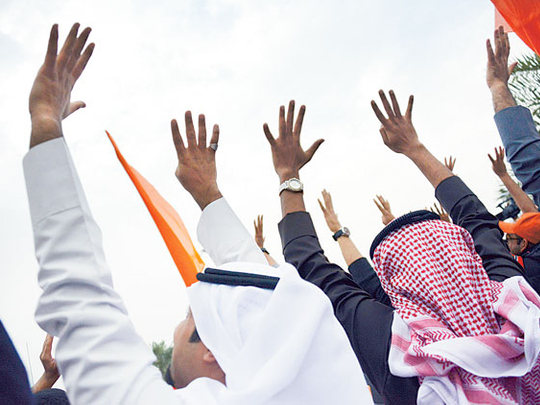
Kuwait: In a room scented with incense, a dozen men in long traditional robes sip sweet tea and debate the political future of Kuwait’s tribes at one of many ‘diwaniya’ across the country, a tradition of evening social gatherings older than Kuwait itself.
The issue looms large in the tribal areas after changes to the voting system ahead of a parliamentary election on December 1 sparked a boycott by opposition politicians, including tribal leaders who said the changes would have worked to their disadvantage in particular.
The dispute shows that the imbalance in power between those “inside and outside the wall” — referring to the series of walls that used to surround the capital area from the 18th to 20th centuries — is alive and well, said Fawaz Al Adei, a lawyer who was at the diwaniya.
“Tribes make up only a small part of the financial system, there is no real representation in government,” he said, clacking his yellow prayer beads. “It is mostly people from the urban areas who control the media, who make the decisions.”
The perceived divide is one of the sources of tensions in the major oil producer and could become more problematic as the tribal population grows, becomes more prosperous and demands more political power.
In the Saber Al Nasser area where the diwaniya took place, some 20 kilometres outside Kuwait City, police had to use tear gas and make arrests to disperse local youths who were protesting the voting changes in rare clashes in recent weeks.
The Interior Ministry said the protests were unauthorised and that people had attacked police and damaged property.
Opposition politicians boycotted the election on the grounds that the changes imposed by Kuwait’s ruling emir, Shaikh Sabah Al Ahmad Al Sabah, would prevent candidates that were not pro-government, including tribal figures, from winning a majority.
As a result, more than half of the lawmakers in the new National Assembly, which opened on Sunday, are newcomers to politics.
Descendents of Kuwait’s old merchant families mainly live in the urban areas while the outlying areas tend to be home to people that were more recent arrivals to the Kuwaiti state.
Many were naturalised after Kuwait’s independence from Britain in 1961, which analysts say was part of the ruling family’s strategy of tempering the influence of the other powerful families by bolstering support in parliament.
Despite having traded their more nomadic traditions for air-conditioned homes and sleek cars decades ago and entering higher education and skilled professions, people from the tribes are still viewed by some in the city as socially inferior.
The conservative tribes started out as loyal to the Al Sabah monarchy, which offers its citizens a generous welfare system and provides secure state jobs for many people from the tribal areas, especially in the police and army. But with greater sophistication has come a greater desire for political and social status, people at the diwaniya said.
“Fifty years ago, we were not educated enough to change our position or the conditions we live in,” said Jasser Al Muteri, a 45-year-old lawyer.
“If you came to this diwaniya even 30 years ago you would not find people with more than a secondary school education. Now you find lawyers, engineers and graduate students,” he said, gesturing at the men seated on plush chairs.
The men said people from their districts were stereotyped in the Kuwaiti media and that while opposition MPs from tribal areas were often quoted, little effort was made to speak to the people themselves.
At a separate women’s gathering upstairs from the diwaniya, a woman who gave her name as Umma Abdullah said dialogue was needed to bring the two communities closer.
“The government and the prime minister and the emir should come to the common ground for negotiating,” she said.
Another woman, Umm Therma, said people from her district needed to be treated with more respect and voiced frustration at the way police had dealt with the protests in the area.
“I am the mother of four attorneys and three engineers but the government fired tear gas at us and there is no respect in that,” she said.
Back at the diwaniya, Mutlak Al Muteri, the eldest man in the group, said a big problem was the structure of the political system.
“It is a worldwide principle that the minority should follow the majority and not vice versa,” the 75-year-old said.
The men in the room said that the security services and judicial system discriminate against the tribes.
“There was a protest in Rumathiya, another part of town, and there was not even a police car there,” said 22-year-old fireman Majd Al Radwi. “Why do they come here? Is it because we are tribes or because of our political ideas?”
The men said the government should be more representative.
“The tribes are more than 50 per cent of the population and now the government is confronted with the tribes,” said Al Muteri, the lawyer. “The government does not have the power to suppress the tribes now.”











